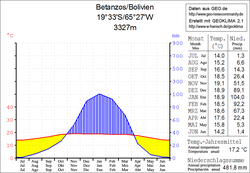Tres Cruces (Linares)
| Tres Cruces | ||
|---|---|---|
| Basic data | ||
| Residents (state) | 2648 pop. (2012 census) | |
| rank | Rank 158 | |
| height | 3453 m | |
| Post Code | 05-1102-0300-7601 | |
| Telephone code | (+591) | |
| Coordinates | 19 ° 52 ′ S , 65 ° 33 ′ W | |
|
|
||
| politics | ||
| Department | Potosí | |
| province | José María Linares Province | |
| climate | ||
 Climate diagram Betanzos |
||
Tres Cruces (also: Tres Cruces Garnica or Tres Cruces Belén ) is a country town in the Potosí department in the South American Andean state of Bolivia .
Location in the vicinity
Tres Cruces is the central place of the canton Belén and is located in the district ( Bolivian : Municipio ) Caiza "D" in the province of José María Linares . The village is located at an altitude of 3453 m on the watershed between the north flowing Río Puna, a tributary in the upper reaches of the Río Pilcomayo , and the south flowing Río La Lava.
geography
Tres Cruces is located at the southern end of the Andes mountain range of the Cordillera Central . The climate of the region is typical of the time of day , in which the mean temperature differences during the day are more pronounced than during the year.
The annual average temperature in the region is around 17 ° C (see Betanzo's climate diagram), the monthly values fluctuate only slightly between 14 ° C in June / July and 19 ° C from November to January. The annual rainfall is almost 500 mm, the months May to September are arid with monthly values below 15 mm, only in January a rainfall of 100 mm is reached.
Transport network
Tres Cruces is located at a distance of 53 kilometers by road southeast of Potosí , the capital of the department.
From Potosí, the 1,215-kilometer-long asphalted highway Ruta1 leads south via Cuchu Ingenio to Tres Cruces and on to Tarija and Bermejo on the Argentine border. At Tres Cruces, a country road branches off to the northeast, which after eleven kilometers reaches the provincial capital Puna .
population
The population of the village has skyrocketed over the past two decades:
| year | Residents | source |
|---|---|---|
| 1992 | 278 | census |
| 2001 | 1 148 | census |
| 2012 | 2,648 | census |
Due to the historical population distribution, the region has a high proportion of Quechua population, in the municipality of Caiza "D" 97 percent of the population speak the Quechua language.
Individual evidence
- ^ INE - Instituto Nacional de Estadística Bolivia 1992
- ^ INE - Instituto Nacional de Estadística Bolivia 2001
- ↑ INE - Instituto Nacional de Estadística Bolivia 2012 ( Memento of the original from July 22, 2011 in the Internet Archive ) Info: The archive link has been inserted automatically and has not yet been checked. Please check the original and archive link according to the instructions and then remove this notice.
- ↑ INE social data 2001 (PDF; 5.5 MB)
Web links
- Relief map of the Sucre region 1: 250,000 (PDF; 11.79 MB)
- Municipio Caiza "D" - detailed map and population data (PDF; 1.11 MB) ( Spanish )
- Municipio Caiza "D" - general maps no. 51102
- Department Potosí - social data of the municipalities (PDF; 5.23 MB)
(spanisch)
